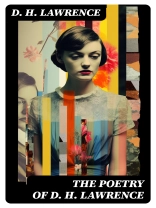In ‘The Poetry of D. H. Lawrence, ‘ the poet explores the profound complexities of human emotion, nature, and existence through a vivid and often visceral literary style. Lawrence’s poetry is characterized by its intense imagery, rhythmic cadence, and deep psychological insight, revealing a world where human relationships intertwine with natural landscapes. Thematically, the collection addresses the primal instincts that shape human behavior, reflecting the backdrop of early 20th-century modernism while challenging societal norms and conventions through a deeply personal lens. D. H. Lawrence was not only a poet but a novelist and essayist whose life experiences heavily influenced his writing. Born in a mining town in England, his tumultuous upbringing exposed him to the struggles of the working class and the intricacies of intimacy, themes which pervade his poetic oeuvre. His friendships, travels, and philosophical inquiries into spirituality and sexuality culminated in a body of work that sought to dismantle repression and explore the depths of human experience. This collection is recommended for readers interested in the intersections of literature, psychology, and philosophy. Lawrence’s poetry presents an invitation to delve into the subconscious and challenge one’s perceptions of love, nature, and self, making it an essential read for those who appreciate profound and reflective literary art.
Over de auteur
David Herbert Lawrence, more popularly known as D. H. Lawrence, was an eminent English writer and poet, born on September 11, 1885, in Eastwood, Nottinghamshire. He was a fervent literary figure whose works encompassed fiction, poetry, essays, and plays, each an exploration of the dehumanizing effects of modernity and industrialization. In his writings, Lawrence delved into themes of emotional health, vitality, spontaneity, and instinct, often drawing from his own experiences and intense personal relationships. He is best remembered for his novels, such as ‘Sons and Lovers’ (1913), ‘Women in Love’ (1920), and ‘Lady Chatterley’s Lover’ (1928), which cumulatively chart the vicissitudes of human connection and the search for a vivid life amidst the constraining morals of English society. While his novels gained immense notoriety and sparked censorship debates due to their frank treatment of sexuality, Lawrence’s poetic oeuvre, as captured in ‘The Poetry of D. H. Lawrence’, showcases his lyricism and a passionate affinity for nature. His poetic works are distinctive for their immediacy, rich imagery, and sensual mystique, which align closely with his broader literary style marked by a detailed psychological portrayal of characters and a vivid depiction of the natural world. Lawrence’s influence on literature endures, as his works continue to be celebrated for their defiance against orthodoxy and their portrayal of human emotion in its rawest form.












